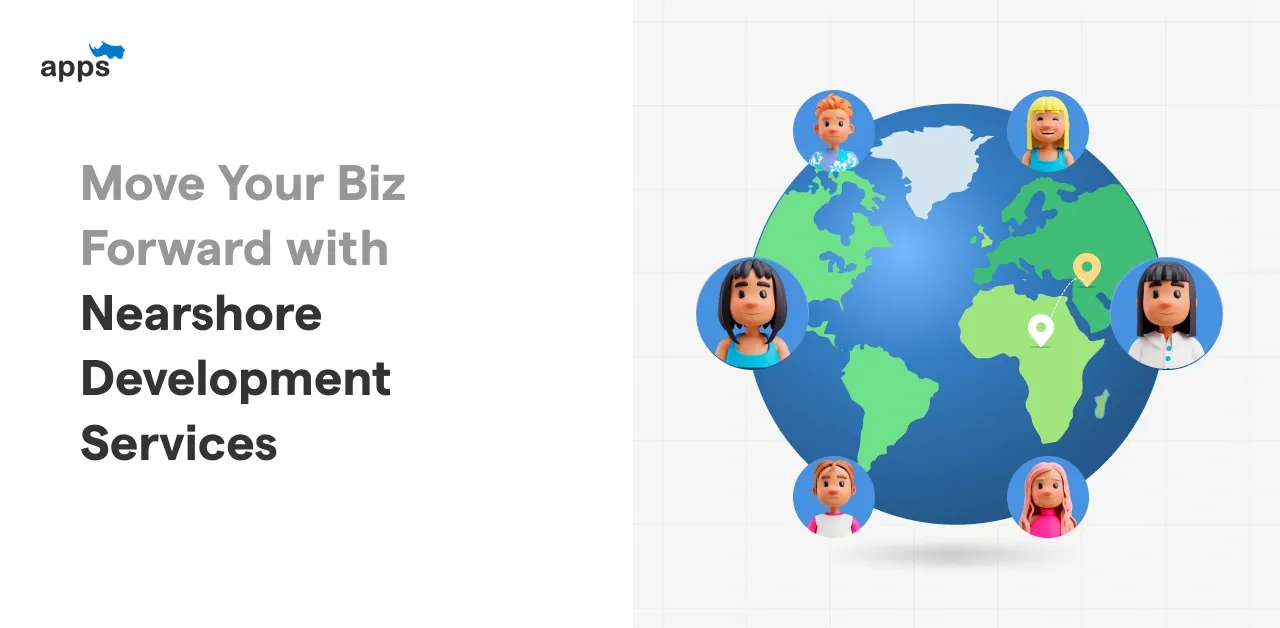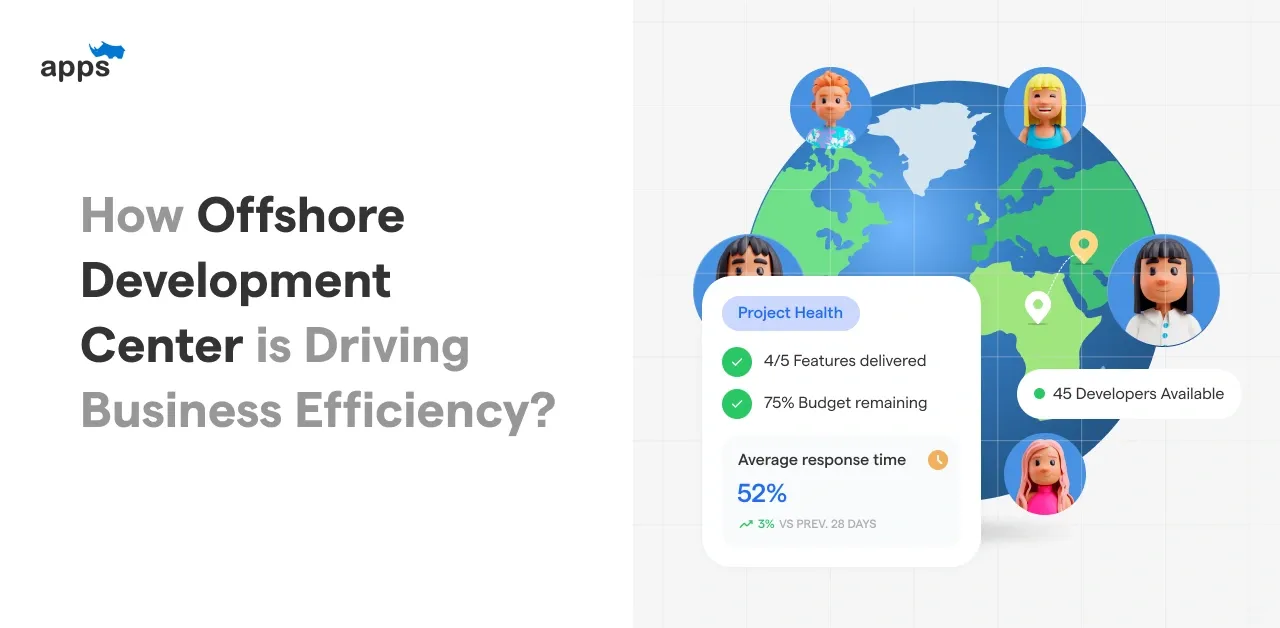- How can outsourcing business help you achieve your goals?
- Advantages of outsourcing
- Challenges of outsourcing business
- How to choose the right outsourcing partner?
- Why is AppsRhino the right outsourcing partner?
- How to mitigate risks associated with outsourcing?
- The cost of outsourcing
- FAQs
- Conclusion
Table of Contents
A Comprehensive Guide on Outsourcing

Outsourcing business means hiring a third-party enterprise to handle specific tasks or services typically done in-house. It's like having an extension of your business that operates independently but with your goals and vision in mind.
Think of it like this - you have a dream, a vision for your business. You know what you want to achieve, but you're overwhelmed by the sheer amount of work that needs to be done. You need help but more time, resources, or expertise to hire an entire team of experts. That's where outsourcing comes in.
Imagine you're a small business owner who wants to expand their customer service department. Instead of hiring and training new staff, you can outsource your customer service to a company like AppsRhino that specializes in the field. AppsRhino will handle your customers' inquiries, complaints, and feedback professionally and efficiently, freeing up your time to focus on other areas of your business.
Outsourcing business can also help you access a wider range of skills and expertise available in various ways. For instance, if you lack the technical expertise to develop a new software program, you can outsource the job to AppsRhino. It has the knowledge, skills, and experience to create a top-quality program that will meet your specifications.
Outsourcing continues to evolve. New trends and technologies are continuously shaping the industry. In this comprehensive guide, we'll explore everything you need to know about outsourcing, from the advantages and challenges to the best practices for choosing a provider.
How can outsourcing business help you achieve your goals?
Outsourcing app development can be a game-changer for businesses looking to achieve their goals. According to Grand View Research, the global outsourcing market was valued at $92.5 billion in 2019 and is expected to reach $1.2 trillion by 2028. It is predicted to grow at a compound annual growth rate (CAGR) of 7.4% from 2021 to 2028.
Here are some tips to make sure that your outsourcing experience leads to success:
1. Be clear about your goals
What is it that you want to achieve with your app? Increased revenue? Streamlined operations? Improved customer engagement? Whatever your goals are, it's important to communicate them clearly to your outsourcing partner. It will help ensure everyone is on the same page and working towards the same result.
2. Do your research
Plenty of app development outsourcing firms are out there, but not all are created equal. Take the time to read reviews, check references, and ask for samples of previous work. It will help you find a partner with the expertise and experience to help you achieve your goals.
3. Establish open lines of communication
Once you've chosen an outsourcing partner, establish open lines of communication. Regular check-ins, progress reports, and feedback sessions help keep everyone on track and ensure the project stays on course. Be willing to listen to your partner's suggestions and ideas, and be clear about your expectations and timelines.
4. Stay engaged and involved
Another key to success is to stay involved in the development process. Even if you're outsourcing the work, staying engaged and providing feedback as needed is important. It will help ensure that the app meets your expectations and achieves your goals.
5. Be patient and flexible
App development can be a complex process, and there may be unforeseen challenges or delays along the way. But with clear communication, a solid plan, and a willingness to work together, you can overcome any obstacles and achieve your goals.
Hence, outsourcing app development can be a great way to achieve your business goals, but it requires careful planning, communication, and collaboration. By following these tips, you can have a successful outsourcing experience that leads to a top-notch app and a successful outcome for your business.
Advantages of outsourcing
Outsourcing business can be a game-changer for businesses of all sizes. It allows you to access specialized services, save time and money, and focus on what you do best.
So, to take your business to the next level, consider outsourcing - it may be the superhero team you've been looking for.
Outsourcing offers a range of advantages for businesses of all sizes and industries. Some of the key advantages of outsourcing include the following:
1. Cost savings
By outsourcing certain functions, businesses can reduce costs associated with hiring and training employees, purchasing equipment, and maintaining infrastructure. Outsourcing service providers typically have the expertise and resources to perform tasks more efficiently and cost-effectively than in-house teams.
2. Access to expertise
Outsourcing allows businesses to tap into the expertise of specialized providers with experience and skills in specific areas. For example, outsourcing IT services to a provider who specializes in cybersecurity can improve a business's security posture and protect against cyber threats.
3. More focus on core competencies
By outsourcing non-core functions, your business can focus on its core competencies and areas of expertise. It can lead to increased productivity, innovation, and better alignment with the company's overall goals and strategy.
4. Scalability and flexibility
outsourcing service providers can offer scalable and flexible solutions that adapt to changing business needs. For example, an outsourcing service provider can quickly ramp up or down resources depending on the level of demand for a particular service.
Suggested Reading:
Challenges of outsourcing business
While outsourcing can offer significant advantages, it also presents some challenges and risks that businesses should be aware of. Some of the key challenges of outsourcing include the following:
1. Quality control
When outsourcing tasks to third-party providers, businesses must ensure that the work meets their quality standards and expectations. It requires clear communication, the collaboration between the business and the outsourcing service provider, and monitoring and oversight to ensure quality control.
2. Data security
Outsourcing can also present risks to data security and confidentiality. Businesses must ensure that the outsourcing service provider has robust security measures to protect sensitive data and intellectual property.
3. Cultural and language barriers
Outsourcing to providers in different countries can present challenges related to cultural and language differences. Businesses must ensure that they have effective communication strategies and processes to overcome these barriers.
How to choose the right outsourcing partner?
Choosing the right outsourcing partner is very critical to the success of outsourcing initiatives. Some factors to consider while selecting an outsourcing service provider include the following:
1. Expertise and Experience
Look for providers with expertise and experience in the areas you want to outsource. Ask for references and case studies to evaluate their track record and capabilities.
2. Cultural Fit
Ensure the outsourcing service provider's culture and values align with yours. It can foster a productive and collaborative partnership.
3. Communication and Collaboration
Look for providers with effective communication and collaboration strategies to ensure that expectations are clear and that work is performed efficiently and effectively.
4. Security and Compliance
Ensure that the outsourcing service provider has robust security measures to protect sensitive data and comply with relevant regulations and standards.
Why is AppsRhino the right outsourcing partner?
Are you looking for a reliable and efficient outsourcing partner to bring your app development dreams to life? Look no further than AppsRhino! Here's why:
- AppsRhino is dedicated to delivering exceptional results for every one of our clients. It takes pride in its ability to create customized app solutions that meet your specific needs and exceed your expectations. With our years of experience and expert team of developers, designers, and project managers, we're confident that we can deliver the app of your dreams.
- AppsRhino, we understand that effective communication is key to a successful partnership. That's why we make it our top priority to keep you in the loop every step of the way. From the initial consultation to the final delivery, we'll work closely with you to ensure that we're on the same page and that your app is shaping up exactly as you envisioned.
- We also believe in transparency and honesty. When you partner with AppsRhino, you can trust that we'll be upfront about our pricing, timelines, and any potential roadblocks or challenges that may arise. We're committed to building long-term relationships with our clients, and that starts with earning your trust.
- Most importantly, we're passionate about what we do. We love helping our clients turn their app ideas into reality, and we pour our hearts and souls into every project we take on. When you work with AppsRhino, you can rest assured that your app is in the hands of a team that cares about your success.
So if you're ready to bring your app vision to life, don't hesitate to reach out to AppsRhino. We are always here to help you achieve your goals!
How to mitigate risks associated with outsourcing?
Outsourcing mobile app development can offer numerous advantages but comes with risks. Here are some tips on how to mitigate those risks:
1. Choose the right outsourcing partner
One significant risk associated with outsourcing is partnering with the wrong provider. Research, read reviews, and check references before committing to a provider. Ensure they have a strong track record of delivering quality work and meeting deadlines.
2. Define clear expectations
Clearly define your project requirements, expectations, and timelines before signing a contract. It will help ensure that you and your outsourcing partner are on the same page from the start, reducing the risk of misunderstandings or miscommunications.
3. Protect your intellectual property
Protecting your intellectual property is crucial when outsourcing mobile app development. Ensure to include clauses in your contract that outline ownership of the app and its code and any proprietary information or trade secrets.
4. Establish communication protocols
Communication is vital when it comes to outsourcing. Establish clear communication protocols, including regular check-ins and progress updates. It will help you stay informed about the development process and address any issues or concerns that may arise promptly.
5. Test, test, test
Thorough testing is essential to mitigating the risks associated with outsourcing. Ensure your outsourcing partner has a robust testing process and that they conduct rigorous testing at every stage of development. It will help catch any bugs or issues before the app goes live.
6. Have a backup plan
It's always recommended to have a backup plan in case something goes wrong. Make sure you have a plan B in case your outsourcing partner runs into unexpected challenges or cannot deliver the project as planned.
The cost of outsourcing
Outsourcing mobile app development comes with risks, but by following these tips, you can mitigate those risks and ensure a successful outcome for your project. Remember to choose the right partner, define clear expectations, protect your intellectual property, establish communication protocols, test thoroughly, and have a backup plan.
The cost of outsourcing can vary widely depending on a variety of factors. Some key factors that can impact the cost of outsourcing include the scope of the project, the complexity of the work, the location of the outsourcing partner, and the level of expertise required.
Outsourcing can be cost-effective for businesses looking to save money on labor costs or reduce the time required to complete a project. Outsourcing partners in countries with lower labor costs, such as India or the Philippines, can offer significant cost savings compared to hiring local employees or contractors.
However, it's important to remember that outsourcing is only sometimes the cheapest option. While outsourcing can offer cost savings, it can also come with additional expenses such as project management, communication, and travel costs if you need to visit your outsourcing partner in person.
The cost of outsourcing can also vary depending on the type of work being outsourced. For example, outsourcing simple tasks such as data entry or customer support may be less expensive than outsourcing more complex tasks such as software development or engineering.
In general, it's essential to consider the costs and advantages of outsourcing before deciding. While outsourcing can offer cost savings and other advantages, weighing these against the potential risks and costs associated with outsourcing, such as quality control issues, communication challenges, and cultural differences, is essential. By carefully considering your options and selecting the right outsourcing partner, you can ensure a successful outsourcing experience that delivers the desired results at a price you can afford.
FAQs
Q1. What is outsourcing?
A1. It is the process of hiring a third-party company or individual to perform tasks for a company, rather than having an in-house team handle those tasks.
Q2. Why do companies outsource?
A2. Companies outsource for a variety of reasons, including cost savings, access to specialized skills and expertise, increased efficiency, and the ability to focus on core business functions.
Q3. What tasks can be outsourced?
A3. Many tasks, including administrative tasks, customer service, IT support, marketing, accounting, and more, can be outsourced. However, some tasks are better suited to outsourcing than others.
Q4. What are the benefits of outsourcing?
A4. The benefits of outsourcing can include cost savings, access to specialized expertise, increased efficiency, scalability, and focus on core business functions.
Q5. What are the risks of outsourcing?
A5. Outsourcing risks can include losing control over the business, lower quality of work, communication challenges, and the possibility of security breaches.
Q6. What are the most common outsourcing destinations?
A6. The most common outsourcing destinations include India, the Philippines, China, Eastern Europe, and Latin America. However, many other countries offer outsourcing services.
Q7. How do I manage an outsourcing team?
A7. To manage an outsourcing team, it's important to establish clear communication channels, set expectations and goals, provide feedback and support, and maintain a strong working relationship.
Conclusion
Outsourcing significantly advantages businesses looking to reduce costs, access expertise, and improve focus on core competencies. However, it also presents challenges related to quality control, data security, and cultural and language barriers.
To choose the right outsourcing partner, Your business must consider AppsRhino for its expertise and experience, cultural fit, communication and collaboration, and security and compliance. By following these best practices, your business can maximize the advantages of outsourcing while minimizing the risks.
Table of Contents
- How can outsourcing business help you achieve your goals?
- Advantages of outsourcing
- Challenges of outsourcing business
- How to choose the right outsourcing partner?
- Why is AppsRhino the right outsourcing partner?
- How to mitigate risks associated with outsourcing?
- The cost of outsourcing
- FAQs
- Conclusion




